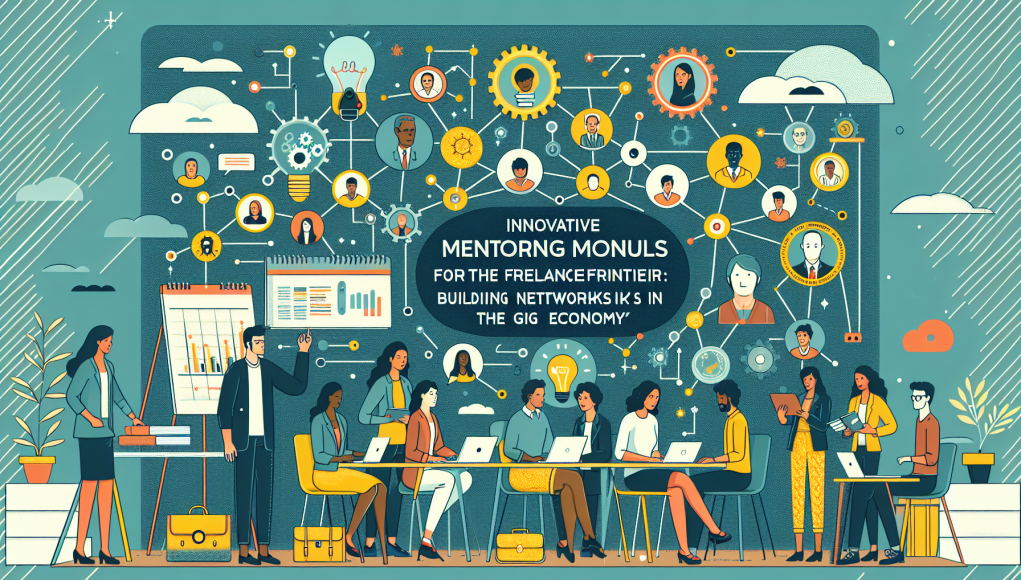Innovative Mentoring Models for the Freelance Frontier: Building Networks in the Gig Economy
January is National Mentoring Month, a time to reflect on the power of mentorship and its role in career development. For those navigating the realms of freelance, gig, and shift work, mentoring can be a beacon of guidance in an often solitary professional journey. Unlike traditional career paths, which are rich with structured mentorship opportunities, non-traditional workers must invent new ways to connect, learn, and grow. In this digital age, innovative mentoring models are emerging to address these unique challenges.
The Unique Challenges of Non-traditional Workers
Freelance, gig, and shift workers often find themselves operating in isolated environments, with fewer opportunities for the organic, face-to-face networking that typically occurs in traditional office settings. This isolation can lead to a sense of professional stagnation and disconnect. Without the infrastructure of a corporate ladder, the path to career advancement can be obscured, making mentorship even more critical for helping individuals identify opportunities and leverage their strengths.
Redefining Mentorship for the Gig Economy
In response to these challenges, mentorship in the gig economy is being redefined. It’s less about hierarchical relationships and more about creating networks of peers who can provide reciprocal support and knowledge-sharing. These new mentorship models are innovative, flexible, and perfectly suited to the dynamic environments that freelance and gig workers navigate.
1. Community-driven Platforms
Platforms such as Meetup and LinkedIn Groups offer spaces where gig workers can form communities around shared interests and challenges. These digital hubs provide opportunities for exchanging advice, sharing experiences, and establishing connections that can evolve into mentorship relationships. Such platforms can foster an environment of communal learning and support, effectively diminishing the isolation many freelancers face.
2. Peer-to-peer Mentoring Networks
In peer-to-peer mentoring, individuals at similar stages in their careers form groups where they offer mutual support and mentorship. This model is less about passing down wisdom from more experienced individuals and more about collaborative learning. Peer mentoring networks allow gig workers to leverage collective insights and experiences, helping each member to navigate challenges and celebrate successes together.
3. Virtual Mastermind Groups
Mastermind groups are a fantastic innovation for freelancers looking to benefit from diverse perspectives. These groups typically consist of small cohorts who meet regularly, sharing ideas, giving feedback, and pushing each other towards achieving their professional goals. The virtual nature of these groups transcends geographical barriers, allowing freelancers from around the world to connect and learn from one another.
4. Project-based Mentorship
This model involves connecting with mentors or peers on specific projects or goals. It’s about finding someone who can provide insights or feedback that are directly applicable to a current challenge. This format allows for focused, relevant mentoring that can yield immediate benefits for freelance and gig workers looking to hone a particular skill or navigate a specific obstacle.
Networking: The Lifeblood of Non-traditional Careers
In the context of freelance and gig work, networking is not a mere complement to mentorship but an integral component. Building a network of contacts can provide the support structure that gig workers need to thrive. It’s about more than just finding workit’s about building relationships that offer inspiration, advice, and opportunities for growth.
Whether through digital platforms, peer networks, or project collaborations, networking allows gig workers to forge meaningful connections that can lead to long-term mentoring relationships. Embracing these innovative approaches to mentorship can transform the career trajectories of those in the freelance, gig, and shift work sectors.
Celebrating Mentorship
This National Mentoring Month, take the opportunity to explore these innovative mentoring models. Whether you’re seeking to expand your professional network or looking to offer your experience to others, remember that in the gig economy, mentorship is a shared journey. By coming together in supportive networks, freelancers can celebrate the collective wisdom that emerges from diverse, non-traditional paths.




























